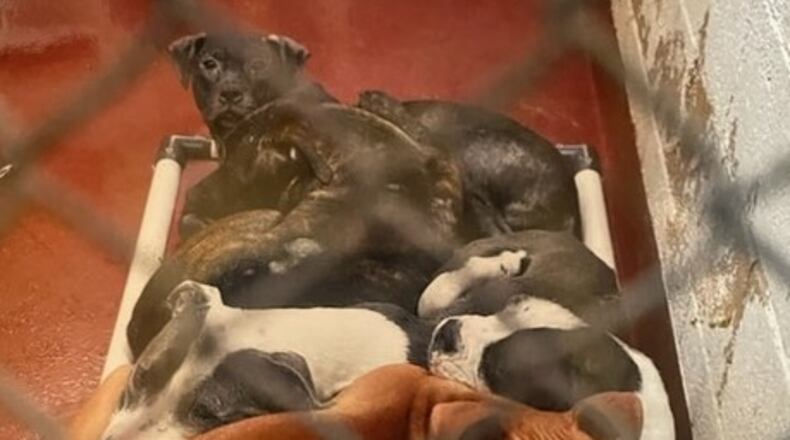While driving through her Stone Mountain subdivision late one evening, Cynthia Houston came across what was for her an unwelcomed sight — a man unloading four adult bulldogs from the back of a rented truck.
Houston, a longtime animal advocate in DeKalb County, pulled over to watch. She knew four dogs were too many for the size of his home; DeKalb County limits the number of household pets, based on acreage.
At least one of the dogs, she observed, was a female who recently had puppies. She would later learn the man was selling the puppies for up to $3,000 apiece.
What she didn’t know was if he was in violation of state laws regulating dog breeding, she said.
Dog breeding is defined in Georgia as selling more than one litter or selling 30 or more adult dogs in a 12-month period.
If you sell under that amount, you’re exempt from state and federal licensing requirements. But, even if you sell more and are in violation of the law, the invisibility of small breeders makes enforcement difficult.
Houston has no idea how many dogs the man ended up selling. Her concern is this: Shelters are filled with adult dogs just past the puppy stage. Many of them come from backyard breeders, according to a 2019 report from Lisa Milot, associate professor of law at the University of Georgia. Unregulated backyard breeders make a hefty profit while taxpayers end up paying the cost of care for excess animals.
“All counties need to have a backyard breeding ordinance,” said Houston, who sat on the DeKalb County Animal Advisory Board for four years. She attempted to introduce one such ordinance in 2016, but it received little support. “They keep putting Band-Aids on the problem,” Houston said about local leaders who opposed the measure. “Why would they be resistant to legislation?”
A few weeks ago, Sally Mansour, co-founder of End the Cycle Georgia in Loganville, contacted me about the issue of backyard breeding. She saw one of my stories from 2021 that questioned whether state regulators are doing enough to track possible violations. She asked if we could talk about ways to address overpopulation that extend beyond the perennial calls for animal lovers to foster or adopt more dogs.
At least once a day, it seems, I read on my neighborhood Nextdoor app about a dog found with no collar, no chip, no nothing. A well-meaning resident takes the dog home to give it food and shelter then searches for help once they discover that traditional resources — animal control, county shelters — are too tapped out to assist.
“We can’t adopt our way out of the issue,” Mansour said. “We think that a moratorium on all breeding in our state should be in effect, except for licensed and inspected legitimate breeders who pay fees to be licensed and pay taxes on their income.”
Though existing laws focus on large scale breeders, those dogs — miniatures, designer dogs, movie breeds — are less likely to end up as strays, said Milot in the 2019 report. Mixed breeds from backyard breeders are more likely to languish in shelters for months before being euthanized.
Part of local officials’ resistance to enacting breeding laws comes from the tendency to paint backyard breeders as hobbyists who breed show dogs or working dogs. Other people who sell dogs aren’t breeders at all, they believe. They’re just people whose pets got pregnant.
“In both cases, excess inventory — unpurchased puppies — must be disposed of, often at a local animal control or abandoned by the side of a road with low likelihood of any consequence despite legal prohibitions on such action in some states,” Milot wrote.
Milot said states should adopt legislation that requires all individuals with a pregnant dog to provide notice to state officials and/or local animal control. The dog would be issued a unique identifier, which must be included on advertisements or sales records if a puppy from that litter is to be sold. An identifier would make small breeders more visible to state and local enforcement agencies.
Local governments in several cities nationwide have enacted ordinances that require a unique identifier. Other municipalities, including at least two counties in Georgia, have regulations that require spaying and neutering, another type of population control that needs more attention, according to animal advocates.
People who are, in fact, backyard breeders have little incentive to have their dogs spayed or neutered. But, if you’re making money on selling animals, you should be paying taxes on that income, Mansour said. More oversight of backyard breeding would help address the persistent problem of overpopulation.
“Make no mistake about it,” Mansour said, “dogs are big business in Georgia.”
Read more on the Real Life blog (www.ajc.com/opinion/real-life-blog/) and find Nedra on Facebook (www.facebook.com/AJCRealLifeColumn) and Twitter (@nrhoneajc) or email her at nedra.rhone@ajc.com.
About the Author
Keep Reading
The Latest
Featured



